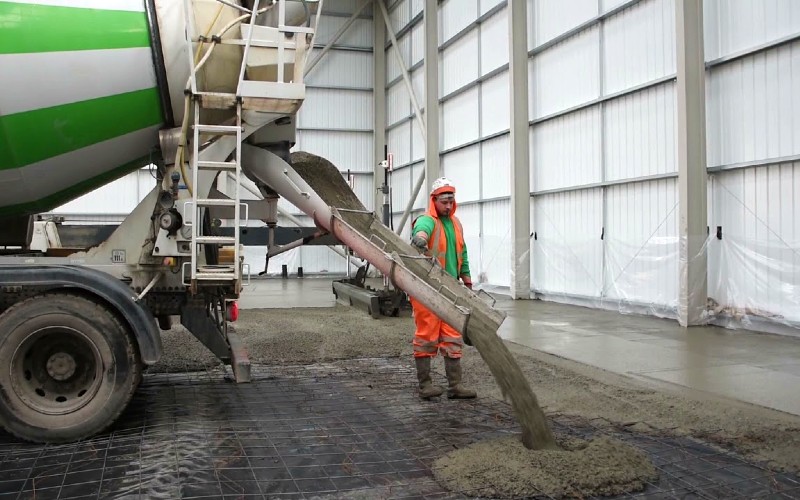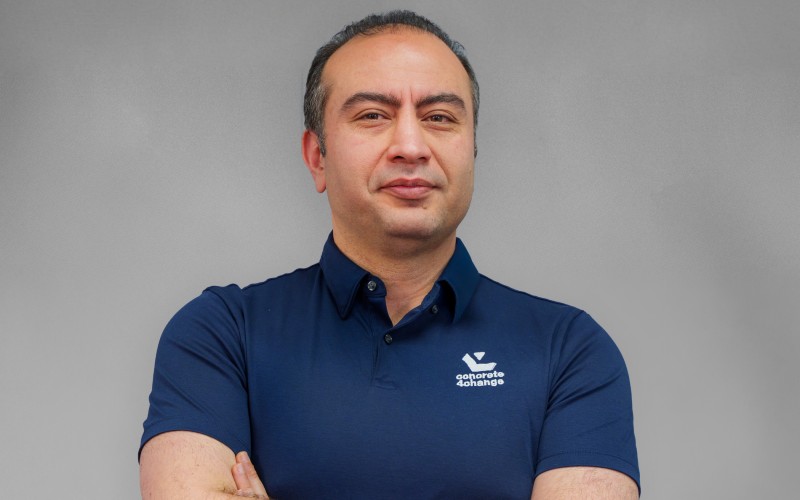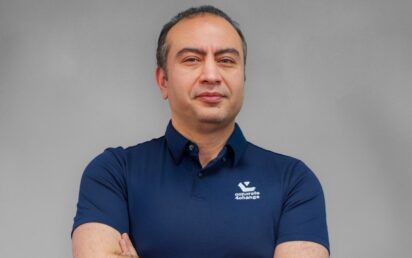Nottingham-based EnviroTech Concrete4Change is boldly attempting to transform one of the world’s most polluting materials into a climate solution.
Founded and led by structural engineer Sid Pourfalah in 2021, the company has created technology that enables concrete to permanently absorb carbon dioxide, making it stronger, cheaper and greener in the process.
Backed by major global investors from Asia, Europe and the US, the business believes it can help decarbonise a trillion-dollar industry and its CEO says his motivation is simple – to help secure a viable future for his young children.
For the planet and his children
For Pourfalah, the mission behind Concrete4Change is deeply personal after his life dramatically changed in the last few years.
“I like to provide a better world for my children, who are two and three years old,” he told BusinessCloud.
The CEO and founder is fully aware that the sector he’s worked in for over two decades is responsible for 8% of global CO2 emissions.
“If they continue business as usual by 2050, they are increasing that significantly,” he warned.
“So what we are trying to do is provide a range of solutions for the construction industry in order to reduce their emissions.”
Concrete4Change: Decarbonising Concrete for a Sustainable Future
Concrete is the second most used material on Earth after water, but Concrete4Change has developed a patented technology that allows concrete to absorb CO2.
This means it is not just capturing it, but storing it inside the material in a way that chemically strengthens the structure and reduces the amount of cement needed.
Using industrial waste materials turned into absorbents, Concrete4Change enables concrete to effectively lock in CO₂ and produce a ‘cleaner, stronger, cheaper’ end product.
Pourfalah continued: “If you inject or sequester CO₂ in the right way, you can increase the strength of concrete.
“You end up with concrete stronger than normal, and because you use less binder, you reduce cost and emissions.”
From academic roots to global attention
Pourfalah spent years in engineering roles, founding companies and as a researcher at Edinburgh and Sheffield before founding the company in 2021.
Between 2021 and late 2022 it was ‘largely ideation and team-building’, with the first significant investment only arriving towards the end of 2022, but the pace has accelerated rapidly since.
In just two completed funding rounds, the firm has raised nearly £5m in equity investment and £1.6m in UK government grants, while it is currently closing a further £5-10m round, with around £6–7m already committed.
Investors include Siam Cement Group (SCG), one of the largest cement manufacturers in the world, Goldbeck in Germany and active conversations with Cemex Ventures’ US team.
Notably, SCG’s stake represented their first ever pre-seed investment in a UK business.
The startup has also won multiple global awards, including the UN COP26 Climate Challenge Cup for most innovative Net-Zero project, the Santander X Global Prize and recognition from PwC, Royal Academy of Engineering and UK Business Angels Association.
It was also one of the stars of our EnviroTech 50 ranking this year.
EnviroTech 50 – UK’s most innovative green tech creators for 2025
The capital challenge of hard tech
Funding, Pourfalah says, is essential in a field like this, with path to market in the industry being more of a challenge.
“Investment is really important, especially for deep tech,” he explained.
“You need a lot of equipment, you need a lot of experts in the team.”
The company has experts in abundance – now employing around 20 staff, most with PhDs, and has built one of the largest cement chemistry labs in Europe.
Unlike some software businesses that can launch revenue almost immediately, the journey is hardware-heavy and time-consuming.
He continued: “It takes five, six years from the time you start to the time the product is ready to go to market. Then you have revenue.
“For that time we must cover all of our costs using either equity investment or non-equity grants from the government.”
Preparing for global rollout
Concrete4Change’s current focus is building a pilot plant, followed by a full demo facility able to produce its CO2 based binder at industrial scale.
“We are working with a lot of big players in the market,” said Pourlafah.
“Once the product is proven at scale, the growth model will be about licensing.
“As soon as we have our first plant in industrial scale and we showcase unit economics, then we switch to licensing.
“Any player that is interested can have their plant using our technology wherever they like in the world.”
With investors in Asia, Europe and North America, the company already has a global footprint.
Europe will remain the beachhead due to stronger CO2 markets and carbon pricing incentives, but Pourfalah says demand is emerging across Asia and the US because the unique selling point is simple.
He explained: “We reduce your emission, it’s not coming at extra expenses and we are not making your life harder by changing your production line.”

Choosing investors for more than money
The company has been selective in fundraising, rejecting offers from investors who could not provide strategic value.
“We had a few more requests for investment in the last two rounds, which we rejected,” he said.
“We chose partners who could open doors in regional markets and adopt the technology.”
Passion project with a plan to exit
Despite a lifetime in decarbonisation and environmental roles, Pourfalah has no intention of running the same company forever.
This is his third venture and he is clear about the exit plan, having said: “We are planning to exit as well, in two different ways.
“Either we do this by scaling the product to tonnage volume and then licensing globally, when a trade sale or institutional exit could make sense, or by spinning out and starting a new journey in another hard-to-abate sector.
“But entrepreneurship is a kind of virus – if you have been an entrepreneur, it’s really hard to switch to a different type of life.”
Despite the plan to exit, the mission remains the same, with the company working towards a healthier and cleaner planet.
“I like to provide a better world for my children,” he reiterated.
“I’m really happy to work in a sector which is contributing in a meaningful way to reducing emissions and providing a better future by tackling this global warming problem.”
A call to the UK construction sector
As the business gears up for scale, Pourfalah hopes more of the UK industry will get hands-on.
He believes companies in Germany are often more proactive, both with capital and collaboration.
“In the UK, I would suggest to them [companies] to be a bit more proactive, a bit more agile in terms of decarbonisation,” he urged.
“We are more than happy to be their partner at no cost, because we are trying to understand the market and develop relationships.
“This is not just a KPI or a target – this is the future of us and the future of our families.”
Manchester spinout secures £4m and Northern Gritstone backing


